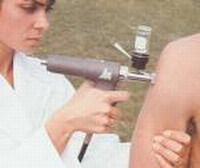Overweight inmate undergoes execution through injection
An overweight inmate was executed by injection after more than an hour delay while prison medical staff tried to find suitable veins in his arms.

The execution of Christopher Newton, who had killed a cellmate in 2001 and insisted on the death sentence, had been set to begin at 10 a.m.
But members of the medical staff at the Southern Ohio Correctional Facility struggled to find veins in each arm, said Leo Jennings, a spokesman for the attorney general.
Newton, 37, was pronounced dead shortly before noon. He weighed 265 pounds (120 kilograms) at his physical on Wednesday. The head of the Public Defender's death penalty division, Joe Wilhelm, said Newton told him it was hard for blood to be taken from his veins because of his weight.
In a written statement read by public defender Robert Lowe after the execution, Newton apologized to his victim's family. "If I could take it back, I would," the statement said. "To my family, I love you and I'm sorry."
A year ago, the execution of another Ohio inmate, Joseph Lewis Clark, also was delayed more than an hour because the team could not find a suitable vein. The case was cited by death penalty opponents as an example of problems with lethal injection.
A group of Ohio inmates is suing over the state's injection method, saying it is unconstitutionally cruel. Problems with lethal injections have caused delays in other states, including one in Florida in December when an inmate needed a second dose of deadly chemicals, prompting Gov. Jeb Bush to suspend all executions in the state as a commission examines its lethal injection process.
Newton beat and choked cellmate Jason Brewer, 27, to death in 2001 after they argued over a chess game.
Although his attorneys argued Newton should be spared the death penalty because of mental disorders, a court last fall found him competent to forgo his appeals. The prosecution had argued that he had feigned mental illness.
The execution team stuck Newton with needles at least 10 times as they worked to get shunts in place to handle the lethal chemicals. Meanwhile, he continued to talk, smile and laugh with the prison staff; at one point, he was even given a bathroom break.
Court documents say Newton, who spent much of his adult life in prison, knew Brewer's killing was a capital crime, and refused to cooperate with investigators unless they sought the death penalty.
Although his attorneys argued Newton should be spared the death penalty because he had a variety of mental disorders, a court last fall found him competent to forgo his appeals. The prosecution had argued that he had feigned mental illness.
Gov. Ted Strickland said Monday he agreed with the Ohio Parole Board's recommendation against sparing him. The governor had delayed Newton's execution for a few months when he first took office in January to research the case.
Strickland was closely monitoring the situation Thursday morning, including speaking with Collins by phone.
"There was not a cause to intervene," Strickland spokesman Keith Dailey said. "Out of an abundance of caution, every precaution was taken before the procedure began to ensure that there would be no problems when the procedure began."
The American Civil Liberties Union of Ohio called on the state to stop executions because of complications with the execution Thursday.
Subscribe to Pravda.Ru Telegram channel, Facebook, RSS!





